Regulus Partners, the strategic consultancy focused on international gambling and related industries, takes a look at some key developments for the gambling industry in its ‘Winning Post’ column.
UK: Regulation – Where’s the Harm?
The publication this week of Britain’s first reporting framework for gambling-related harm offered a glimpse of future public policy debates – and set out a number of clear challenges for the industry.
The report, which was commissioned by the Responsible Gambling Strategy Board, identifies nine recommendations for collecting data on the societal and public health costs of excessive gambling. The list comprises the loss of employment (and increased welfare payments); bankruptcy and debt relief; homelessness; increased debt; the commission of crimes; divorce and relationship breakdown; stress, anxiety and mental and physical health issues; and suicide and suicide ideation.
The report’s lead author is the eminent Dr Heather Wardle – and the work of her team on this project is a long overdue addition to the evidence base for guiding gambling policy. Critically, it highlights how the debate on gambling is shifting from the abstract concept of problem gambling towards the more vivid (and relevant) realm of harm.
The collection of reliable data on harms may undermine some of the more fantastic claims from the anti-gambling lobby; but it also presents a significant challenge to the industry. The incidence of harm lends itself to availability bias in a way that reports on the prevalence of problem gambling do not.
Two years ago, eight-year-old Keira Broadhead of Wakefield was murdered (along with her father, Andrew) in an arson attack reportedly linked to the perpetrator’s gambling addiction. While such extreme harms are rare (and probably far more complex than press reports suggest), there is a force to them that allows no counter-balance. One simply cannot weigh jobs and taxes against such human costs.
The recent launch of the pressure group, ‘Gambling with Lives’ (formed by bereaved families) has raised the profile of gambling-related suicide – and Parliament is taking notice. The Conservative peer, Lord Chadlington has repeatedly pressed the Government on this issue and shows no sign of relenting.
The relative severity (in financial terms) of recent sanctions from the Gambling Commission reflects our regulator’s deepening interest in the consequences of licensing breaches. The £2.3m Gala Coral settlement in 2017 (which included £1.3m of revenue foregone and a £1m punitive element) related to just two of the licensee’s customers; but both are now serving time for crimes committed to fund their gambling.
The Commission has made it clear (within its revised enforcement strategy) that it is prepared to move to licence revocation if “what happened seriously affected consumers, either deliberately or through incompetence”. Quite rightly, the outcomes matter rather than the simple facts of non-compliance.
As we wrote last week in our blog (http://reguluspartners.com/index.php/2018/07/06/in-pursuit-of-balance-stuck-in-the-middle-with-who/), while the focus on harm is both important and overdue, “there is a risk that – unleavened by broader considerations – it may skew thinking in relation to what constitutes effective and proportionate regulation”.
How the gambling industry responds to the changing nature of regulatory discourse will be key. Spin is not the answer; but it is not entirely clear what is. The first step has to be to engage with the subject and to understand it. Only by confronting and addressing the harms can licensees hope to be considered credible witnesses to this debate.
UK: In Parliament – It’s About Time
It is perhaps a reflection of the state of government in Britain that, the best part of two years after the DCMS launched its review of machine gambling, so many questions on FOBTs remain unanswered. This week, the Bishop of St Albans, Alan Smith took the Government to task on the key question of when the maximum stake on machines in betting shops would be reduced to £2.
The Government – the statutory instrument required to effect the change will be laid (as an affirmative resolution) in the autumn. Given that we have just one week to go before summer recess, this revelation smacks of the bleeding obvious and leaves us all better informed but none the wiser.The noble prelate did at least force some new information out of.
In what was a fairly uncomfortable debate for the Government, Lord Ashton of Hyde was harangued from all sides. Lord Cormack and Lord Debden (Conservative), Lord Griffiths of Burry Port and Lord Rooker (Labour), Lord Foster of Bath and Lord Tyler (Liberal Democrat) and the Bishop of Chester all supported Smith’s calls for swift implementation of stake reduction and questioned the ethics of delay.
Lord Ashton’s suggestion that timing would be in part be dictated by considerations of employment effects indicates that HM Treasury may (for now) have carried the day in its tug of war with the DCMS; but this is a sticky wicket for the Government to defend.
The Bishop of St Albans also submitted a Parliamentary Question on the nature of ministerial and civil service meetings with stakeholders in relation to FOBT policy. He is not the first to probe this subject – and it is unlikely that he will gain much satisfaction – but it all adds to the pressure.
The progress of EDM 1440, which calls for immediate stake reduction is another sign of the gathering pressure. A further five MPs signed the EDM this week, including the out of favour but high profile Chuka Umunna (Lab, Streatham). The EDM now has 46 signatures, making it the 114th best-supported EDM of this Parliament (out of 1,530).
This was also the week when Matt Hancock (Cons, West Suffolk) called time on his stint as Culture Secretary. Hancock may only have spent six months in the post (as part of a two year tour of duty in the DCMS) but will be remembered for shepherding the FOBT review through to a conclusion of sorts. His successor, Jeremy Wright (Cons, Kenilworth & Southam) appears to have little interest in matters of gambling policy – something which undoubtedly commended him to the role.
Hancock is unlikely to be free and clear of gambling with questions of policy likely to follow him to the Department of Health and Social Care.
Elsewhere, the Conservative peer Lord Chadlington continued to press the Government on gambling advertising (suggesting that the DCMS consider the impending ban in Italy as a useful precedent); and on the relationship between “online gambling and levels of loneliness in the UK”. The latter question appears particularly canny given the gambling minister Tracey Crouch’s (Cons, Chatham & Aylesford) interest in the question of loneliness. After all, she is a Spurs fan.
US: sportsbetting – New Jersey shores up demand?
The stats for the first two weeks of NJs landbased sportsbetting market are very similar to Delaware’s: optically very encouraging in handle terms (US$16.4m), artificially high gross margins and including a dominant player (in this case Monmouth Park: 66% share, albeit at least in part due to being first). Pretty much all the same caveats flagged for Delaware apply therefore when seeking to extrapolate (in a word, don’t).
Early landbased trading, for all its interpretative issues, does at least demonstrate one (unsurprising) thing – pent up demand for sportsbetting in the US is material and customers are prepared to show up to wager (at least during the ‘novelty’ phase). Number of unique users is probably the best early measure of sustainability and these are not visible. However, we reiterate our view that the key danger of early US noise is not the slowness of market evolution but the potential for false positives of early legislative activity (which leads nowhere fast) and early encouraging trading (which soon dissipates or at least does not grow into anything meaningful in strategic terms). The early days are usually those of greatest enthusiasm and the biggest willingness to spin everything into a positive – it is therefore the phase where the pursuit of “first mover advantage” can lead to significant corporate mistakes…
UK: sports rights – racecourse rebellion…
Ascot racecourse has once again refused to follow the crowd in terms of its commercial arrangements, with a new TV rights deal struck with Sky Sports Racing, due to commence in March 2019. This most recent ‘rebellion’ follows the course’s decision not to join the racecourse’s operated pool betting project, Britbet, instead opting to partner with Betfred to create its own offering. RMG will still be responsible for the course’s betting shop pictures and International distribution.
This deal is a timely boost for Sky Sports Racing (due to launch early 2019), having suffered the loss of Irish racing from its roster (announced this spring). The channel, which is free to Sky subscribers, now has the potential to make further big wins from RUK when contracts come up for renewal with a more compelling offer to customers than the previous SD ATR content, which often lacked quality. Ascot’s separatism is undoubtedly good commercially for Ascot and the long-term future of GB racing needs to be built upon sound commercial decisions. However, further evidence of splitting a product designed at source to hang together is in danger of lessening the overall customer experience rather than enhancing it – and the vast majority of stakeholders have neither Ascot’s power nor luxury of choice.
Global: cryptocurrencies – now you see it, now you don’t!
In China a special investigation team of the country’s police force has seized over $1.5m worth of cryptocurrencies as part of an ongoing investigation into illegal gambling during the 2018 FIFA World Cup.
Chinese state operated news agency Xinhua reported on July 11 that authorities attention had been drawn to the unnamed gambling platform in May following advertisements that claimed it would “accept international recognised cryptocurrencies including bitcoin, ether and litecoin” in order to draw in users. An investigation was launched soon after, according to the outlet.
Investigators discovered that the site, based overseas, utilised a traditional online gambling model coupled with cryptocurrency payments. It is believed that the site adopted regulatory loopholes in which it was able to secure profits by hiding proceeds using virtual currencies. Over the eight months the site remained active around 333,000 used the site, which reportedly generated an estimated transactional volume of $1.5bn. Six of the website organisers have been arrested thus far.
In 2012, the European Central Bank defined virtual currency as “a type of unregulated, digital money, which is issued and usually controlled by its developers, and used and accepted among the members of a specific virtual community”. To follow on from this in the US, the IRS decided in March 2014 to treat virtual currency as taxable property rather than currency. As the popularity of these virtual currencies continue to rise in our view as does the requirement for them to become regulated and recognised as currency.
Global: M&A Watch – Stars Group and Sky Betting & Gaming; Sportradar; Gala.
On Wednesday, Stars Group announced the formal completion of its acquisition of Sky Betting & Gaming, which was agreed in April at a reported price of £3.36bn. Today, the CMA has published an Initial Enforcement Order which states that it is considering whether to make a reference of the arrangement under the Enterprise Act 2002 (relating to potential “substantial lessening of competition”). The Order obliges the relevant companies to take a number of steps to ensure the businesses remain distinct during the process.
Canada Pension Plan Investment Board and Silicon Valley-based growth equity firm TCV have together acquired a stake in Sportradar at an enterprise value of €2.1bn, from private equity firm.
EQT and minority shareholders. The transaction is expected to formally close in Q4 2018.
Caledonia Investments’ Q2 2018 quarterly report revealed a further £14m investment in Gala Bingo, to enable the company to launch an online presence and rebrand as Buzz Bingo.









